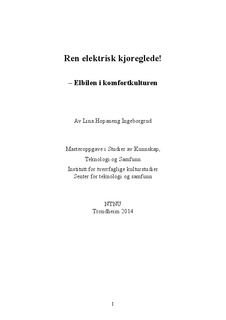| dc.description.abstract | The car has become an essential part of our transportation system - it gives us
the flexibility and the possibility to go anywhere, anytime. Most people in
Norway have a car, and almost feel as if they can´t make it through the day
without it. However, the car is also a threat to our environment, and the electric
car has been proposed as a solution to this problem. Why and how has the
electric car become such a success story in Norway?
In January 2013, I was an intern at Transnova for three weeks. Transnova
provide grants to different projects to reduce CO2-emissions from the
transportation sector. This thesis is about the electric car in our comfort society,
focusing on user experiences, written on assignment from Transnova.
My research data was gathered from 15 interviews - eight with electric car
owners, and seven with people driving petrol cars. I have used the STS
perspectives and theories co-production, framing, social construction of
technology and domestication to find out how the car in general has been
domesticated into households, and how the electric car is stabilized in our
driving culture. The electric car drivers said their electric car felt more
comfortable than petrol cars, describing the car as a safe, environmentally
friendly, economic, aesthetically pleasing and exciting technology with great
driving characteristics. Electric car drivers also thought charging at home was
easier than using petrol stations. Their choice had a lot to do with "hands on"
experience with the electric cars. Test-driving may therefore be a good way to
recruit new users. The petrol car drivers felt guilty about the environment when
they used their cars, and said that this guilt diminished their enjoyment from
driving. It seemed like an increasing climate threat made petrol drivers
problematize their driving practice.
The research found that political incentives, designed to encourage electric car
usage, were important to the electric car drivers in the beginning - when drivers
first made the decision to go electric. However, as they became accustomed to
using their electric car the relative importance of these incentives was reduced.
Instead, users valued electric vehicles in terms of both the material and technical
equipment, and also the rewarding feeling of being more environmentally
friendly. The environmental awareness and comfort seemed to act in synergy,
creating a more pleasurable driving experience. Politics can help stabilizing
technologies, but it can´t do it alone. Instead, it is the co-production of politics,
science and users that may organize this field. The research shows that there is a
demand for a political push regarding technology choices. | nb_NO |
